Systemic Counselling Report: Skills, Theory, and Personal Reflection
VerifiedAdded on 2020/12/28
|8
|2077
|293
Report
AI Summary
This report provides a comprehensive analysis of a couples counselling session, focusing on the skills employed by the therapist, the application of systems theory, and the therapist's personal reflection on the session. The report begins by identifying and evaluating the systemic counselling skills used, such as communication, professional boundaries, non-judgmental attitude, patience, and empathy. It also addresses areas where skills were lacking, such as leadership and critical thinking. The second part of the report explores the systems theory lens, discussing how the family is viewed as an emotional framework and the rationale for follow-up sessions. The report emphasizes the importance of follow-up sessions to address underlying issues and help the couple find compromise. The final section offers a personal reflection by the therapist, highlighting their learning experiences, identifying areas for improvement, and discussing how to enhance skills such as critical thinking, leadership, and emotional attachment. The report concludes by emphasizing the significant role therapists play in improving relationships and the importance of continuous professional development.
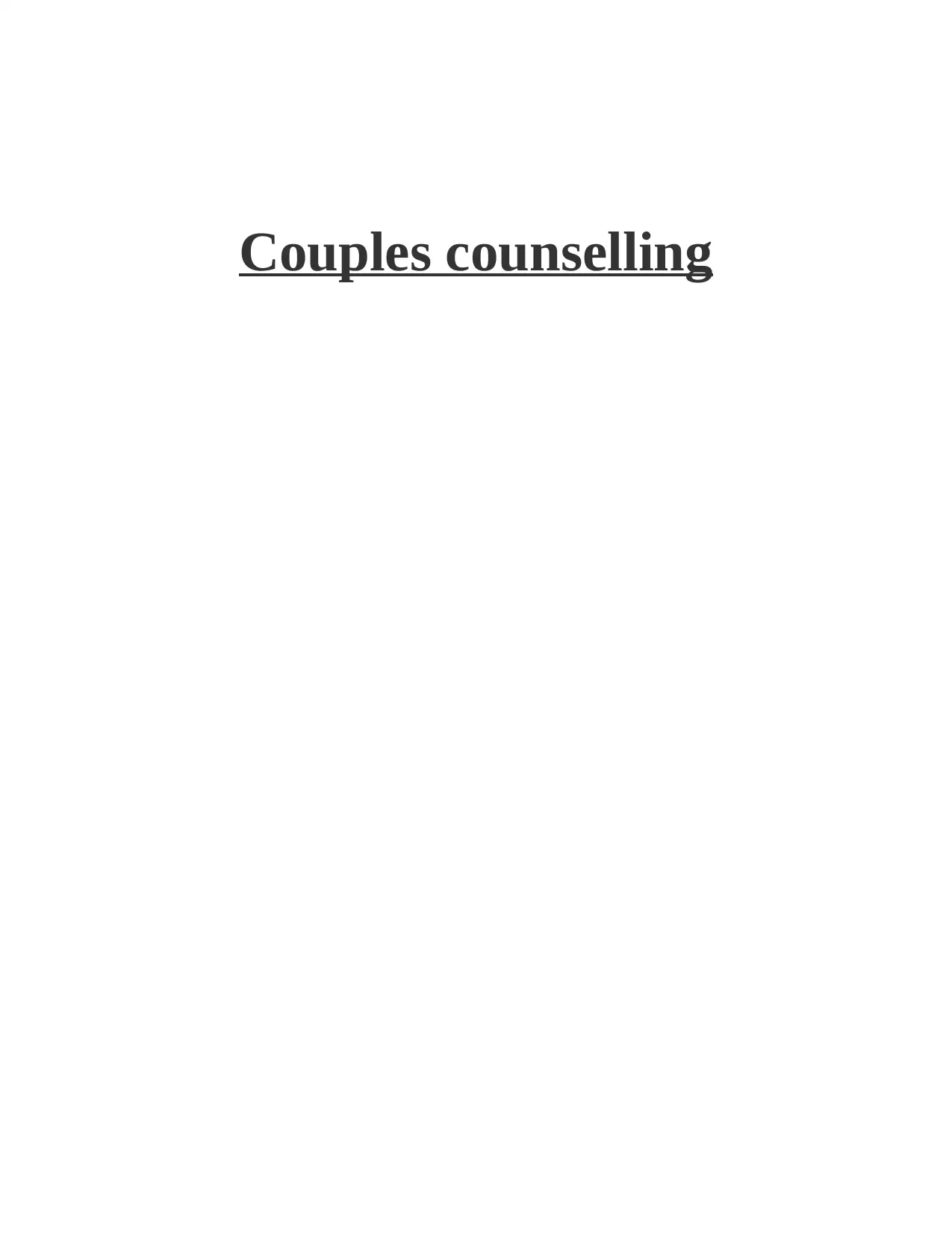
Couples counselling
Paraphrase This Document
Need a fresh take? Get an instant paraphrase of this document with our AI Paraphraser
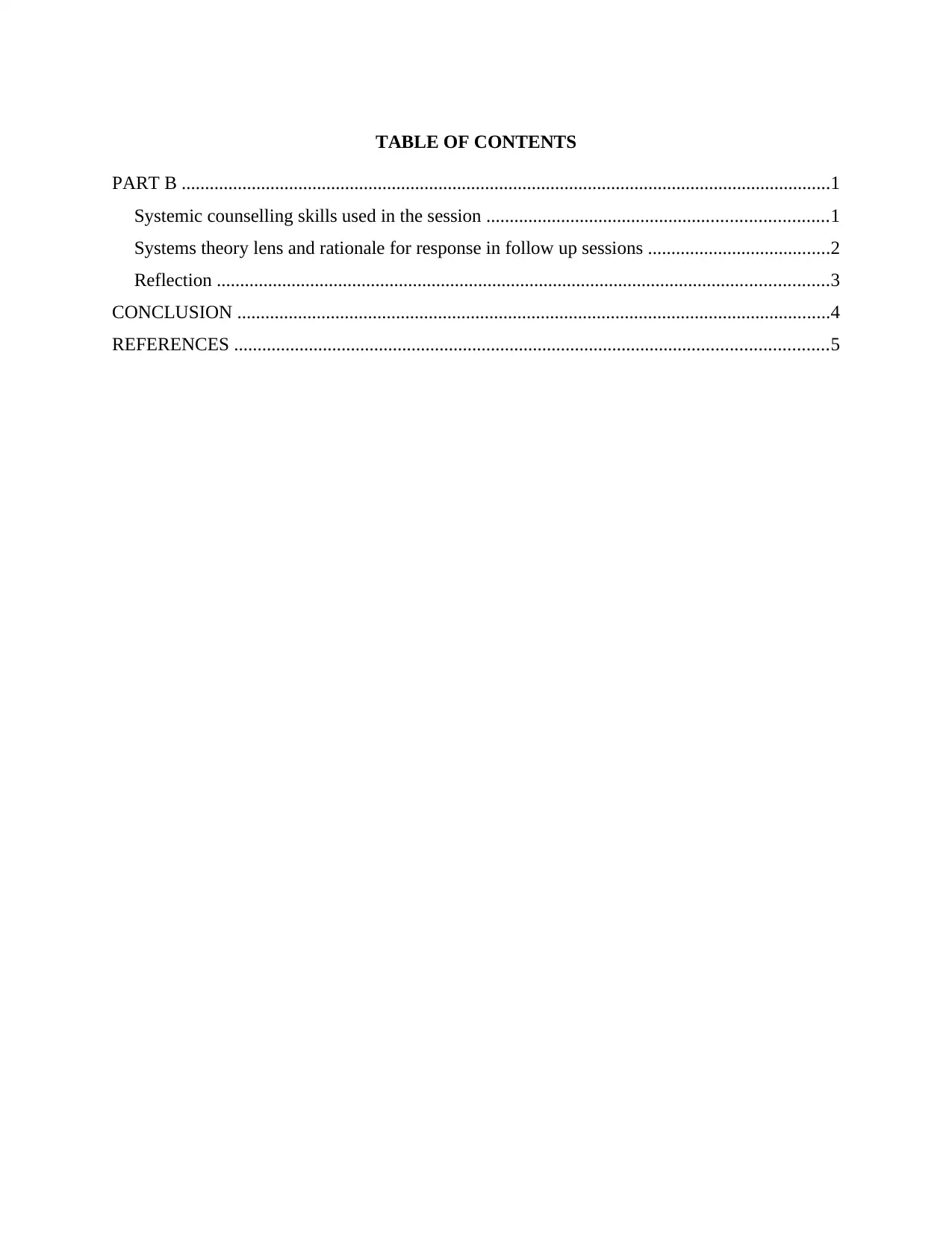
TABLE OF CONTENTS
PART B ...........................................................................................................................................1
Systemic counselling skills used in the session .........................................................................1
Systems theory lens and rationale for response in follow up sessions .......................................2
Reflection ...................................................................................................................................3
CONCLUSION ...............................................................................................................................4
REFERENCES ...............................................................................................................................5
PART B ...........................................................................................................................................1
Systemic counselling skills used in the session .........................................................................1
Systems theory lens and rationale for response in follow up sessions .......................................2
Reflection ...................................................................................................................................3
CONCLUSION ...............................................................................................................................4
REFERENCES ...............................................................................................................................5
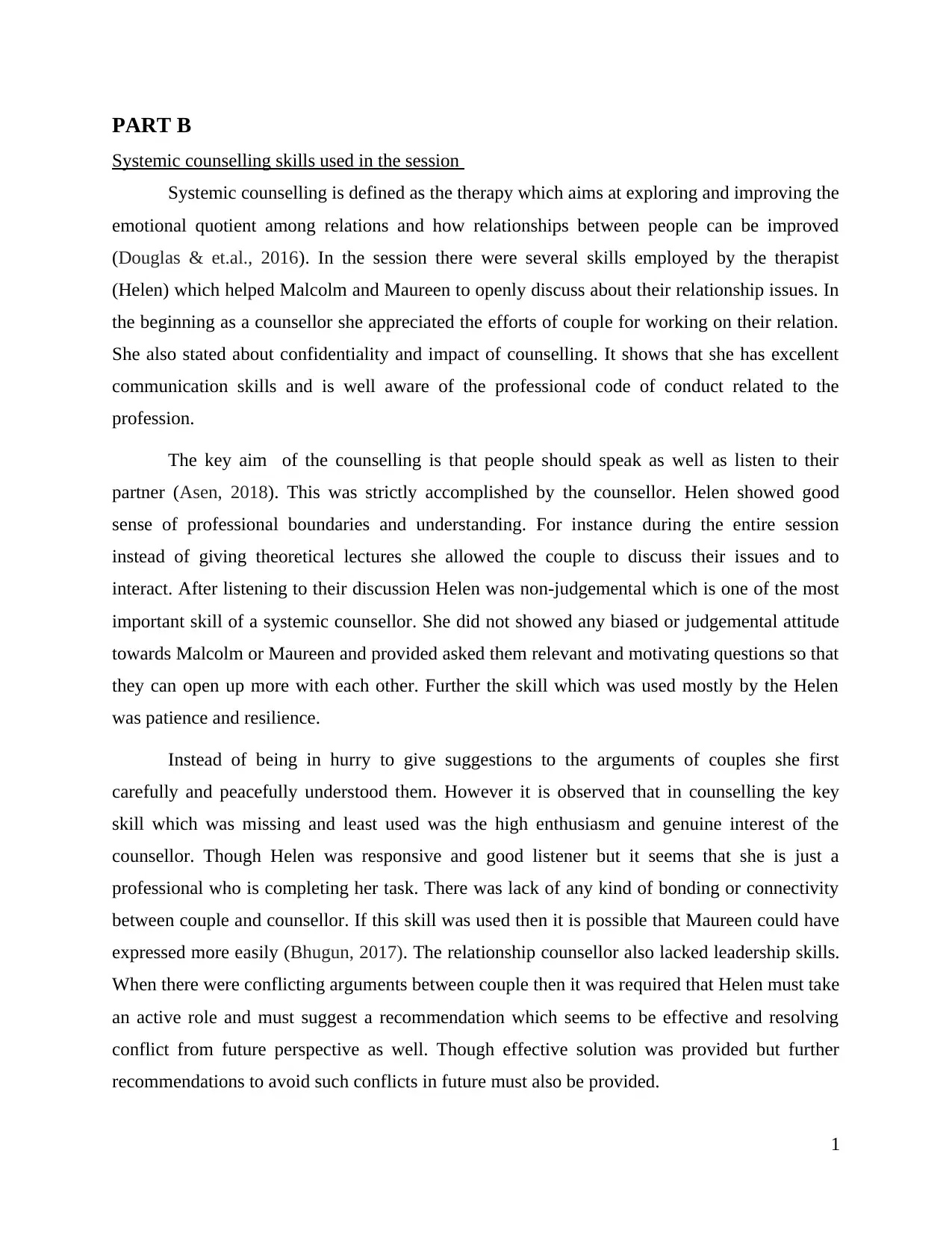
PART B
Systemic counselling skills used in the session
Systemic counselling is defined as the therapy which aims at exploring and improving the
emotional quotient among relations and how relationships between people can be improved
(Douglas & et.al., 2016). In the session there were several skills employed by the therapist
(Helen) which helped Malcolm and Maureen to openly discuss about their relationship issues. In
the beginning as a counsellor she appreciated the efforts of couple for working on their relation.
She also stated about confidentiality and impact of counselling. It shows that she has excellent
communication skills and is well aware of the professional code of conduct related to the
profession.
The key aim of the counselling is that people should speak as well as listen to their
partner (Asen, 2018). This was strictly accomplished by the counsellor. Helen showed good
sense of professional boundaries and understanding. For instance during the entire session
instead of giving theoretical lectures she allowed the couple to discuss their issues and to
interact. After listening to their discussion Helen was non-judgemental which is one of the most
important skill of a systemic counsellor. She did not showed any biased or judgemental attitude
towards Malcolm or Maureen and provided asked them relevant and motivating questions so that
they can open up more with each other. Further the skill which was used mostly by the Helen
was patience and resilience.
Instead of being in hurry to give suggestions to the arguments of couples she first
carefully and peacefully understood them. However it is observed that in counselling the key
skill which was missing and least used was the high enthusiasm and genuine interest of the
counsellor. Though Helen was responsive and good listener but it seems that she is just a
professional who is completing her task. There was lack of any kind of bonding or connectivity
between couple and counsellor. If this skill was used then it is possible that Maureen could have
expressed more easily (Bhugun, 2017). The relationship counsellor also lacked leadership skills.
When there were conflicting arguments between couple then it was required that Helen must take
an active role and must suggest a recommendation which seems to be effective and resolving
conflict from future perspective as well. Though effective solution was provided but further
recommendations to avoid such conflicts in future must also be provided.
1
Systemic counselling skills used in the session
Systemic counselling is defined as the therapy which aims at exploring and improving the
emotional quotient among relations and how relationships between people can be improved
(Douglas & et.al., 2016). In the session there were several skills employed by the therapist
(Helen) which helped Malcolm and Maureen to openly discuss about their relationship issues. In
the beginning as a counsellor she appreciated the efforts of couple for working on their relation.
She also stated about confidentiality and impact of counselling. It shows that she has excellent
communication skills and is well aware of the professional code of conduct related to the
profession.
The key aim of the counselling is that people should speak as well as listen to their
partner (Asen, 2018). This was strictly accomplished by the counsellor. Helen showed good
sense of professional boundaries and understanding. For instance during the entire session
instead of giving theoretical lectures she allowed the couple to discuss their issues and to
interact. After listening to their discussion Helen was non-judgemental which is one of the most
important skill of a systemic counsellor. She did not showed any biased or judgemental attitude
towards Malcolm or Maureen and provided asked them relevant and motivating questions so that
they can open up more with each other. Further the skill which was used mostly by the Helen
was patience and resilience.
Instead of being in hurry to give suggestions to the arguments of couples she first
carefully and peacefully understood them. However it is observed that in counselling the key
skill which was missing and least used was the high enthusiasm and genuine interest of the
counsellor. Though Helen was responsive and good listener but it seems that she is just a
professional who is completing her task. There was lack of any kind of bonding or connectivity
between couple and counsellor. If this skill was used then it is possible that Maureen could have
expressed more easily (Bhugun, 2017). The relationship counsellor also lacked leadership skills.
When there were conflicting arguments between couple then it was required that Helen must take
an active role and must suggest a recommendation which seems to be effective and resolving
conflict from future perspective as well. Though effective solution was provided but further
recommendations to avoid such conflicts in future must also be provided.
1
⊘ This is a preview!⊘
Do you want full access?
Subscribe today to unlock all pages.

Trusted by 1+ million students worldwide
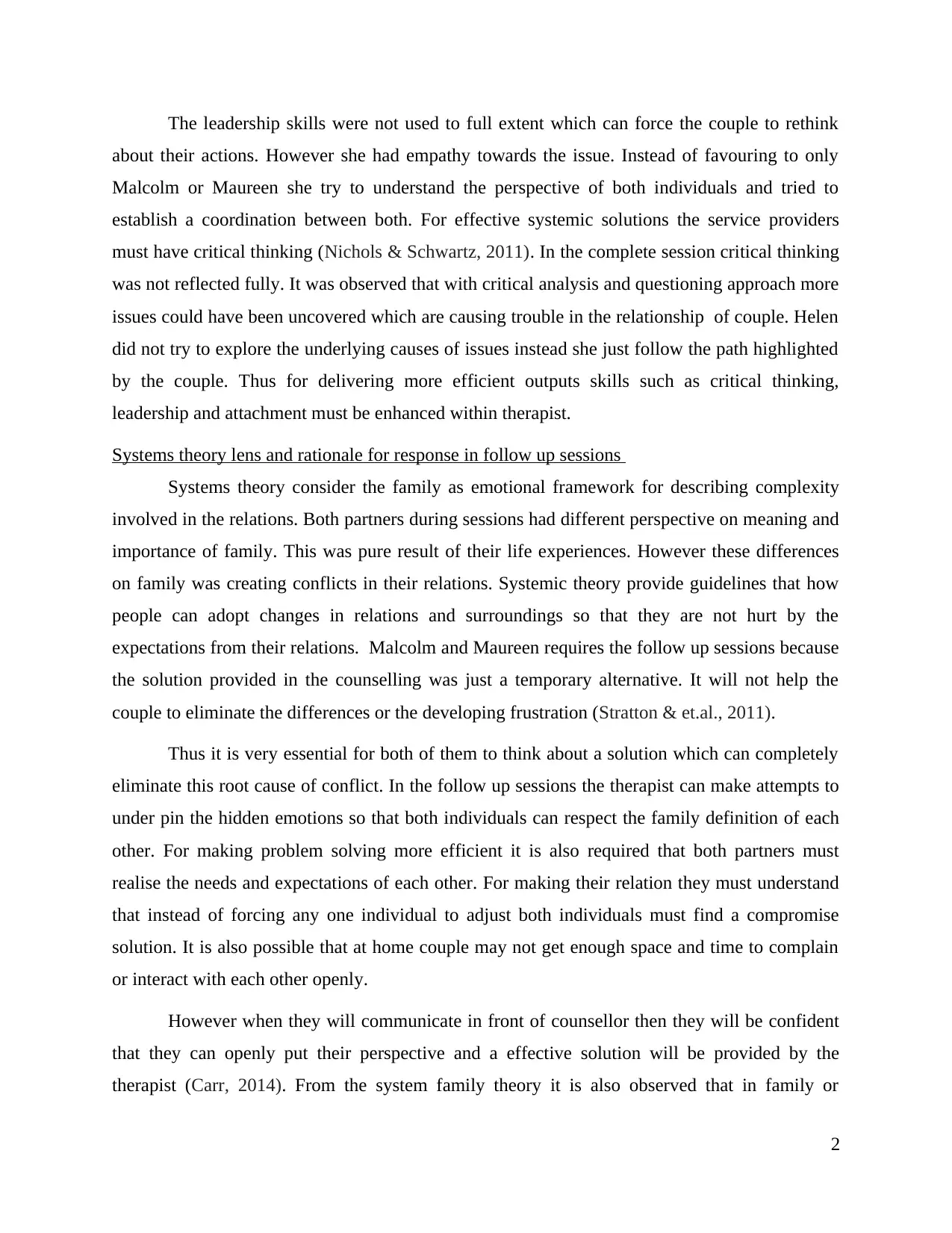
The leadership skills were not used to full extent which can force the couple to rethink
about their actions. However she had empathy towards the issue. Instead of favouring to only
Malcolm or Maureen she try to understand the perspective of both individuals and tried to
establish a coordination between both. For effective systemic solutions the service providers
must have critical thinking (Nichols & Schwartz, 2011). In the complete session critical thinking
was not reflected fully. It was observed that with critical analysis and questioning approach more
issues could have been uncovered which are causing trouble in the relationship of couple. Helen
did not try to explore the underlying causes of issues instead she just follow the path highlighted
by the couple. Thus for delivering more efficient outputs skills such as critical thinking,
leadership and attachment must be enhanced within therapist.
Systems theory lens and rationale for response in follow up sessions
Systems theory consider the family as emotional framework for describing complexity
involved in the relations. Both partners during sessions had different perspective on meaning and
importance of family. This was pure result of their life experiences. However these differences
on family was creating conflicts in their relations. Systemic theory provide guidelines that how
people can adopt changes in relations and surroundings so that they are not hurt by the
expectations from their relations. Malcolm and Maureen requires the follow up sessions because
the solution provided in the counselling was just a temporary alternative. It will not help the
couple to eliminate the differences or the developing frustration (Stratton & et.al., 2011).
Thus it is very essential for both of them to think about a solution which can completely
eliminate this root cause of conflict. In the follow up sessions the therapist can make attempts to
under pin the hidden emotions so that both individuals can respect the family definition of each
other. For making problem solving more efficient it is also required that both partners must
realise the needs and expectations of each other. For making their relation they must understand
that instead of forcing any one individual to adjust both individuals must find a compromise
solution. It is also possible that at home couple may not get enough space and time to complain
or interact with each other openly.
However when they will communicate in front of counsellor then they will be confident
that they can openly put their perspective and a effective solution will be provided by the
therapist (Carr, 2014). From the system family theory it is also observed that in family or
2
about their actions. However she had empathy towards the issue. Instead of favouring to only
Malcolm or Maureen she try to understand the perspective of both individuals and tried to
establish a coordination between both. For effective systemic solutions the service providers
must have critical thinking (Nichols & Schwartz, 2011). In the complete session critical thinking
was not reflected fully. It was observed that with critical analysis and questioning approach more
issues could have been uncovered which are causing trouble in the relationship of couple. Helen
did not try to explore the underlying causes of issues instead she just follow the path highlighted
by the couple. Thus for delivering more efficient outputs skills such as critical thinking,
leadership and attachment must be enhanced within therapist.
Systems theory lens and rationale for response in follow up sessions
Systems theory consider the family as emotional framework for describing complexity
involved in the relations. Both partners during sessions had different perspective on meaning and
importance of family. This was pure result of their life experiences. However these differences
on family was creating conflicts in their relations. Systemic theory provide guidelines that how
people can adopt changes in relations and surroundings so that they are not hurt by the
expectations from their relations. Malcolm and Maureen requires the follow up sessions because
the solution provided in the counselling was just a temporary alternative. It will not help the
couple to eliminate the differences or the developing frustration (Stratton & et.al., 2011).
Thus it is very essential for both of them to think about a solution which can completely
eliminate this root cause of conflict. In the follow up sessions the therapist can make attempts to
under pin the hidden emotions so that both individuals can respect the family definition of each
other. For making problem solving more efficient it is also required that both partners must
realise the needs and expectations of each other. For making their relation they must understand
that instead of forcing any one individual to adjust both individuals must find a compromise
solution. It is also possible that at home couple may not get enough space and time to complain
or interact with each other openly.
However when they will communicate in front of counsellor then they will be confident
that they can openly put their perspective and a effective solution will be provided by the
therapist (Carr, 2014). From the system family theory it is also observed that in family or
2
Paraphrase This Document
Need a fresh take? Get an instant paraphrase of this document with our AI Paraphraser
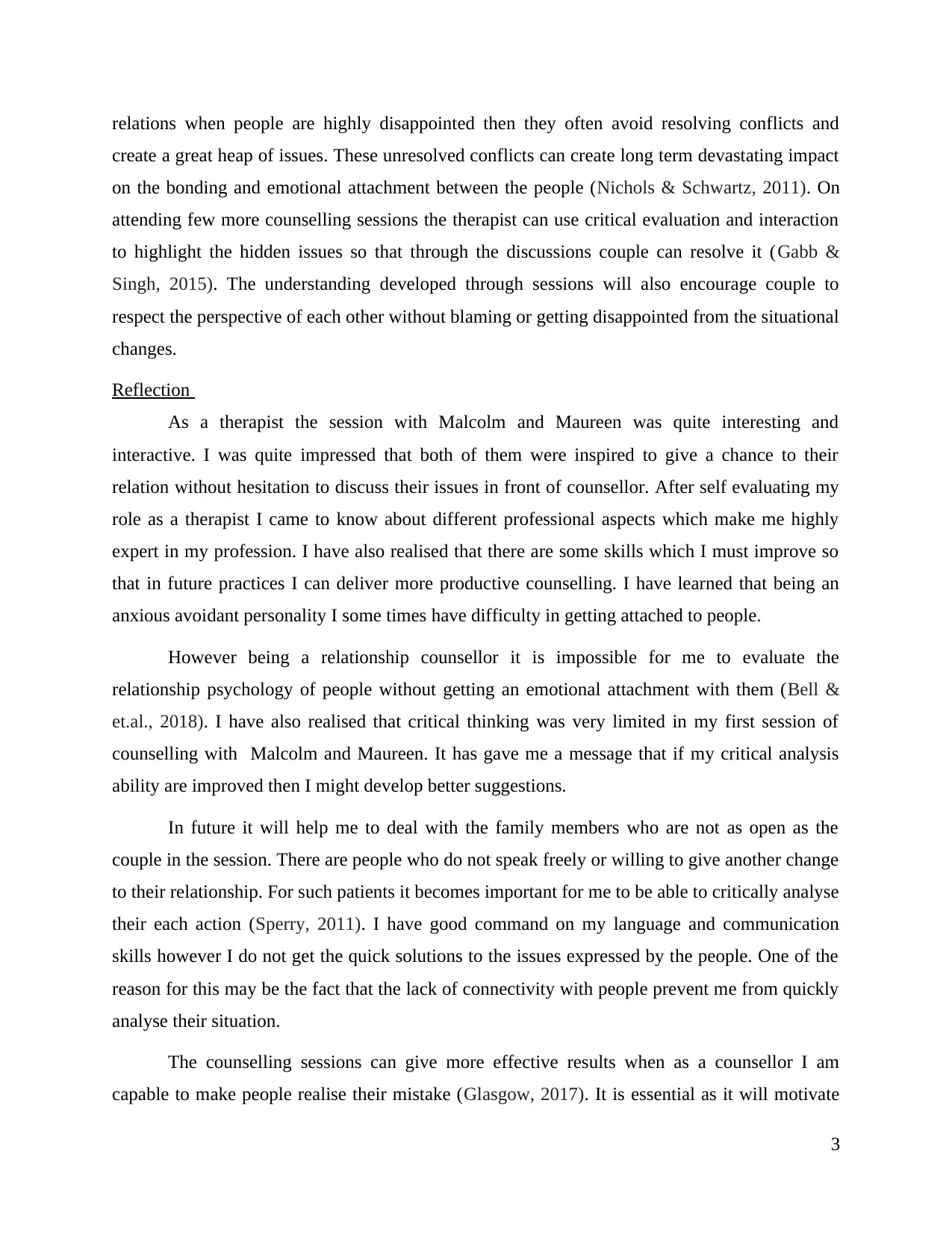
relations when people are highly disappointed then they often avoid resolving conflicts and
create a great heap of issues. These unresolved conflicts can create long term devastating impact
on the bonding and emotional attachment between the people (Nichols & Schwartz, 2011). On
attending few more counselling sessions the therapist can use critical evaluation and interaction
to highlight the hidden issues so that through the discussions couple can resolve it (Gabb &
Singh, 2015). The understanding developed through sessions will also encourage couple to
respect the perspective of each other without blaming or getting disappointed from the situational
changes.
Reflection
As a therapist the session with Malcolm and Maureen was quite interesting and
interactive. I was quite impressed that both of them were inspired to give a chance to their
relation without hesitation to discuss their issues in front of counsellor. After self evaluating my
role as a therapist I came to know about different professional aspects which make me highly
expert in my profession. I have also realised that there are some skills which I must improve so
that in future practices I can deliver more productive counselling. I have learned that being an
anxious avoidant personality I some times have difficulty in getting attached to people.
However being a relationship counsellor it is impossible for me to evaluate the
relationship psychology of people without getting an emotional attachment with them (Bell &
et.al., 2018). I have also realised that critical thinking was very limited in my first session of
counselling with Malcolm and Maureen. It has gave me a message that if my critical analysis
ability are improved then I might develop better suggestions.
In future it will help me to deal with the family members who are not as open as the
couple in the session. There are people who do not speak freely or willing to give another change
to their relationship. For such patients it becomes important for me to be able to critically analyse
their each action (Sperry, 2011). I have good command on my language and communication
skills however I do not get the quick solutions to the issues expressed by the people. One of the
reason for this may be the fact that the lack of connectivity with people prevent me from quickly
analyse their situation.
The counselling sessions can give more effective results when as a counsellor I am
capable to make people realise their mistake (Glasgow, 2017). It is essential as it will motivate
3
create a great heap of issues. These unresolved conflicts can create long term devastating impact
on the bonding and emotional attachment between the people (Nichols & Schwartz, 2011). On
attending few more counselling sessions the therapist can use critical evaluation and interaction
to highlight the hidden issues so that through the discussions couple can resolve it (Gabb &
Singh, 2015). The understanding developed through sessions will also encourage couple to
respect the perspective of each other without blaming or getting disappointed from the situational
changes.
Reflection
As a therapist the session with Malcolm and Maureen was quite interesting and
interactive. I was quite impressed that both of them were inspired to give a chance to their
relation without hesitation to discuss their issues in front of counsellor. After self evaluating my
role as a therapist I came to know about different professional aspects which make me highly
expert in my profession. I have also realised that there are some skills which I must improve so
that in future practices I can deliver more productive counselling. I have learned that being an
anxious avoidant personality I some times have difficulty in getting attached to people.
However being a relationship counsellor it is impossible for me to evaluate the
relationship psychology of people without getting an emotional attachment with them (Bell &
et.al., 2018). I have also realised that critical thinking was very limited in my first session of
counselling with Malcolm and Maureen. It has gave me a message that if my critical analysis
ability are improved then I might develop better suggestions.
In future it will help me to deal with the family members who are not as open as the
couple in the session. There are people who do not speak freely or willing to give another change
to their relationship. For such patients it becomes important for me to be able to critically analyse
their each action (Sperry, 2011). I have good command on my language and communication
skills however I do not get the quick solutions to the issues expressed by the people. One of the
reason for this may be the fact that the lack of connectivity with people prevent me from quickly
analyse their situation.
The counselling sessions can give more effective results when as a counsellor I am
capable to make people realise their mistake (Glasgow, 2017). It is essential as it will motivate
3
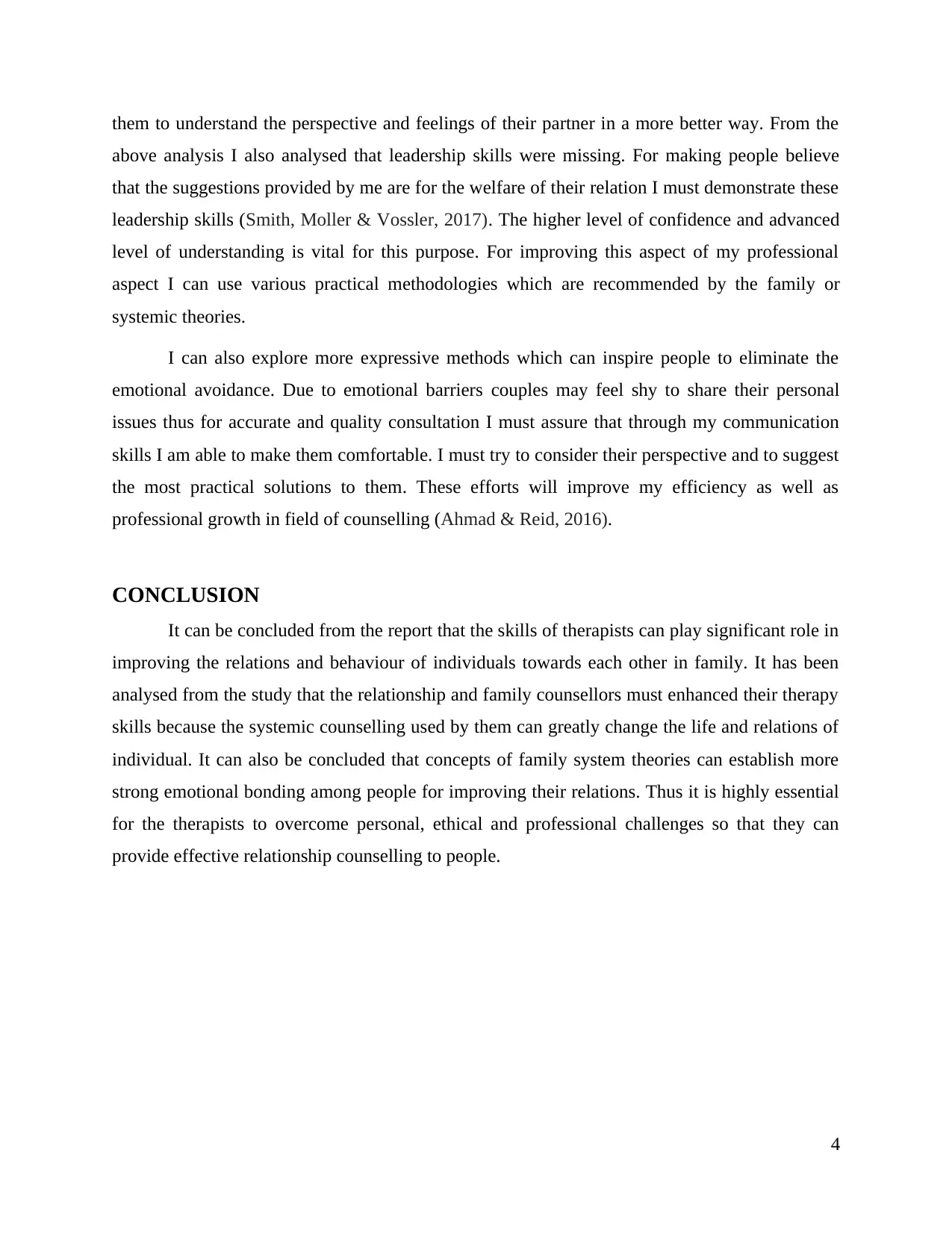
them to understand the perspective and feelings of their partner in a more better way. From the
above analysis I also analysed that leadership skills were missing. For making people believe
that the suggestions provided by me are for the welfare of their relation I must demonstrate these
leadership skills (Smith, Moller & Vossler, 2017). The higher level of confidence and advanced
level of understanding is vital for this purpose. For improving this aspect of my professional
aspect I can use various practical methodologies which are recommended by the family or
systemic theories.
I can also explore more expressive methods which can inspire people to eliminate the
emotional avoidance. Due to emotional barriers couples may feel shy to share their personal
issues thus for accurate and quality consultation I must assure that through my communication
skills I am able to make them comfortable. I must try to consider their perspective and to suggest
the most practical solutions to them. These efforts will improve my efficiency as well as
professional growth in field of counselling (Ahmad & Reid, 2016).
CONCLUSION
It can be concluded from the report that the skills of therapists can play significant role in
improving the relations and behaviour of individuals towards each other in family. It has been
analysed from the study that the relationship and family counsellors must enhanced their therapy
skills because the systemic counselling used by them can greatly change the life and relations of
individual. It can also be concluded that concepts of family system theories can establish more
strong emotional bonding among people for improving their relations. Thus it is highly essential
for the therapists to overcome personal, ethical and professional challenges so that they can
provide effective relationship counselling to people.
4
above analysis I also analysed that leadership skills were missing. For making people believe
that the suggestions provided by me are for the welfare of their relation I must demonstrate these
leadership skills (Smith, Moller & Vossler, 2017). The higher level of confidence and advanced
level of understanding is vital for this purpose. For improving this aspect of my professional
aspect I can use various practical methodologies which are recommended by the family or
systemic theories.
I can also explore more expressive methods which can inspire people to eliminate the
emotional avoidance. Due to emotional barriers couples may feel shy to share their personal
issues thus for accurate and quality consultation I must assure that through my communication
skills I am able to make them comfortable. I must try to consider their perspective and to suggest
the most practical solutions to them. These efforts will improve my efficiency as well as
professional growth in field of counselling (Ahmad & Reid, 2016).
CONCLUSION
It can be concluded from the report that the skills of therapists can play significant role in
improving the relations and behaviour of individuals towards each other in family. It has been
analysed from the study that the relationship and family counsellors must enhanced their therapy
skills because the systemic counselling used by them can greatly change the life and relations of
individual. It can also be concluded that concepts of family system theories can establish more
strong emotional bonding among people for improving their relations. Thus it is highly essential
for the therapists to overcome personal, ethical and professional challenges so that they can
provide effective relationship counselling to people.
4
⊘ This is a preview!⊘
Do you want full access?
Subscribe today to unlock all pages.

Trusted by 1+ million students worldwide
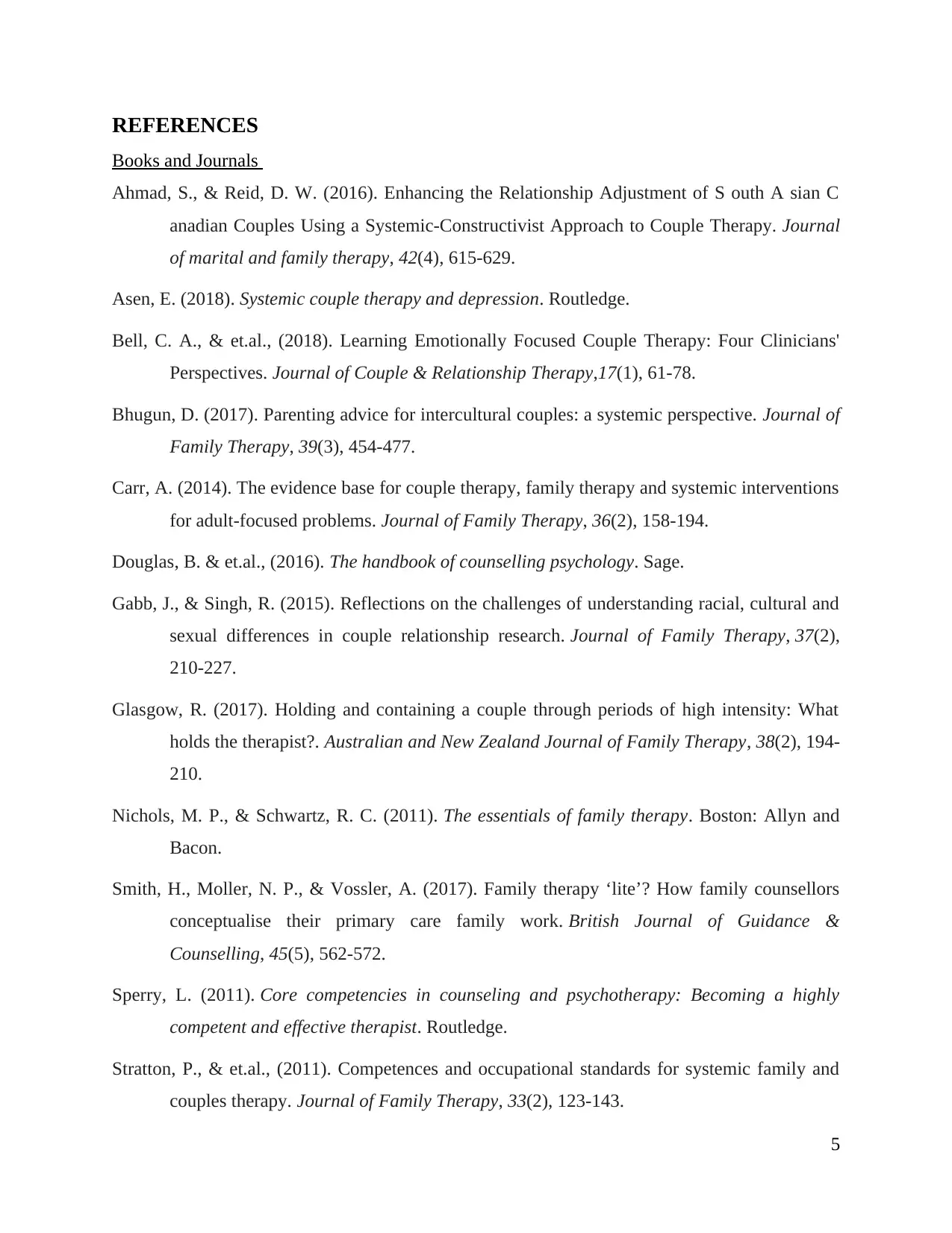
REFERENCES
Books and Journals
Ahmad, S., & Reid, D. W. (2016). Enhancing the Relationship Adjustment of S outh A sian C
anadian Couples Using a Systemic‐Constructivist Approach to Couple Therapy. Journal
of marital and family therapy, 42(4), 615-629.
Asen, E. (2018). Systemic couple therapy and depression. Routledge.
Bell, C. A., & et.al., (2018). Learning Emotionally Focused Couple Therapy: Four Clinicians'
Perspectives. Journal of Couple & Relationship Therapy,17(1), 61-78.
Bhugun, D. (2017). Parenting advice for intercultural couples: a systemic perspective. Journal of
Family Therapy, 39(3), 454-477.
Carr, A. (2014). The evidence base for couple therapy, family therapy and systemic interventions
for adult‐focused problems. Journal of Family Therapy, 36(2), 158-194.
Douglas, B. & et.al., (2016). The handbook of counselling psychology. Sage.
Gabb, J., & Singh, R. (2015). Reflections on the challenges of understanding racial, cultural and
sexual differences in couple relationship research. Journal of Family Therapy, 37(2),
210-227.
Glasgow, R. (2017). Holding and containing a couple through periods of high intensity: What
holds the therapist?. Australian and New Zealand Journal of Family Therapy, 38(2), 194-
210.
Nichols, M. P., & Schwartz, R. C. (2011). The essentials of family therapy. Boston: Allyn and
Bacon.
Smith, H., Moller, N. P., & Vossler, A. (2017). Family therapy ‘lite’? How family counsellors
conceptualise their primary care family work. British Journal of Guidance &
Counselling, 45(5), 562-572.
Sperry, L. (2011). Core competencies in counseling and psychotherapy: Becoming a highly
competent and effective therapist. Routledge.
Stratton, P., & et.al., (2011). Competences and occupational standards for systemic family and
couples therapy. Journal of Family Therapy, 33(2), 123-143.
5
Books and Journals
Ahmad, S., & Reid, D. W. (2016). Enhancing the Relationship Adjustment of S outh A sian C
anadian Couples Using a Systemic‐Constructivist Approach to Couple Therapy. Journal
of marital and family therapy, 42(4), 615-629.
Asen, E. (2018). Systemic couple therapy and depression. Routledge.
Bell, C. A., & et.al., (2018). Learning Emotionally Focused Couple Therapy: Four Clinicians'
Perspectives. Journal of Couple & Relationship Therapy,17(1), 61-78.
Bhugun, D. (2017). Parenting advice for intercultural couples: a systemic perspective. Journal of
Family Therapy, 39(3), 454-477.
Carr, A. (2014). The evidence base for couple therapy, family therapy and systemic interventions
for adult‐focused problems. Journal of Family Therapy, 36(2), 158-194.
Douglas, B. & et.al., (2016). The handbook of counselling psychology. Sage.
Gabb, J., & Singh, R. (2015). Reflections on the challenges of understanding racial, cultural and
sexual differences in couple relationship research. Journal of Family Therapy, 37(2),
210-227.
Glasgow, R. (2017). Holding and containing a couple through periods of high intensity: What
holds the therapist?. Australian and New Zealand Journal of Family Therapy, 38(2), 194-
210.
Nichols, M. P., & Schwartz, R. C. (2011). The essentials of family therapy. Boston: Allyn and
Bacon.
Smith, H., Moller, N. P., & Vossler, A. (2017). Family therapy ‘lite’? How family counsellors
conceptualise their primary care family work. British Journal of Guidance &
Counselling, 45(5), 562-572.
Sperry, L. (2011). Core competencies in counseling and psychotherapy: Becoming a highly
competent and effective therapist. Routledge.
Stratton, P., & et.al., (2011). Competences and occupational standards for systemic family and
couples therapy. Journal of Family Therapy, 33(2), 123-143.
5
Paraphrase This Document
Need a fresh take? Get an instant paraphrase of this document with our AI Paraphraser

6
1 out of 8
Your All-in-One AI-Powered Toolkit for Academic Success.
+13062052269
info@desklib.com
Available 24*7 on WhatsApp / Email
![[object Object]](/_next/static/media/star-bottom.7253800d.svg)
Unlock your academic potential
Copyright © 2020–2026 A2Z Services. All Rights Reserved. Developed and managed by ZUCOL.


